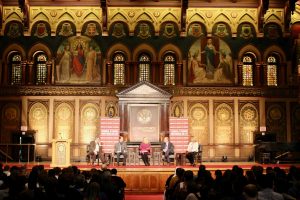GUSA passed an act at its April 13 senate meeting in support of student free speech on campus. Senator Sam Lovell (CAS ’25) introduced the bill after Georgetown University Police Department (GUPD) officers physically removed several pro-Palestine student protesters from Healy Hall on April 11. The bill passed with 21 votes in favor and one abstention.
The act has five demands, asking that the university:
- refrain from disciplining any student who participated in the April 11 demonstration who did not physically obstruct or verbally harass community members;
- provide “more frequent and transparent” communication about federal immigration authorities implicating Georgetown community members;
- not presume that individuals are non-students if they use facial coverings;
- clarify its policies on student demonstrations, identification protocols, and access to campus buildings;
- affirm that peaceful student protest is legitimate and protected under the university’s Jesuit identity and mission.
After the April 11 protest, Vice President for Student Affairs Eleanor Daugherty and Vice President for Public Affairs Erik Smulson sent an email to members of the Georgetown community about the protest. The email stated that protesters who were identified and found in violation of university policy would face disciplinary action.
“I was troubled, quite frankly, when I saw the email from Dr. Daugherty and Mr. Smulson and their commitment to pursue discipline against students without specifying the nature of what the discipline would be or what the alleged violation was,” Lovell told the Voice.
Lovell said that while demonstrators wore face coverings and protested during Georgetown Admissions Ambassador Program (GAAP) weekend, their actions were not necessarily harmful.
“I don’t think it’s a crime to be there, be masked, demonstrate, and do it during GAAP weekend. There’s a really rich history of student demonstrators occupying Healy Foyer, [and] doing so in a manner that is obstructive but not necessarily threatening people or preventing people from occupying the space,” Lovell said.
In their email, Daugherty and Smulson wrote, “protesters disrupted university business, blocked a stairwell, and did not respond to multiple directives from officials to stop the disruption.”
The Voice reporter at the protest witnessed demonstrators block the Healy stairwell and ignore GUPD orders to end the protest or move it to a free speech zone. The Voice did not witness protesters blocking egress from the building.
On April 11, a university spokesperson reiterated the university’s commitment to free speech in a statement to the Voice.
“We respect the rights of members of our community to express their personal views and are committed to maintaining the values of academic freedom and serving as a forum for the free exchange of ideas, even when those ideas may be controversial and objectionable to some,” the spokesperson wrote to the Voice after the Friday protest.
Georgetown’s policy on speech and expression states that the university “may reasonably regulate the time, place, and manner of expression to ensure that it does not disrupt the ordinary activities of the institution.”
Lovell said that he introduced the bill to ensure that students were only disciplined for legitimate reasons.
“The main objective was to ensure that if discipline is pursued, that it’s done so not because the students were in Healy Hall, but for reasons that are more legitimate and that have some grounding in the policies,” he said.
Lovell said that there are understandable reasons students may seek anonymity or privacy by wearing a facial covering or not identifying themselves. The protest comes after a federal crackdown against Pro-Palestine student activists and the recent revocation of about six Georgetown community members’ immigration statuses.
Evan Cornell (CAS ’27), who was one of the co-sponsors on the bill, wrote in a statement to the Voice that he hopes that the university will be responsive to GUSA’s bill.
“Our body recognizes the importance of every single student voice on our campus. I am hopeful that the University will handle our propositions and requests with care and listen to student voices, just as we in GUSA do each week,” Cornell wrote.
Georgetown has a long history of activism on campus, and supporters of the bill argue that the university’s free speech guidelines should support the demonstrators’ actions on April 11.
“Students have long enjoyed the liberty to speak freely on this campus. Peaceful student sit-ins and teach-ins have been practiced at varying times and for various reasons for the past decade, with five separate instances that come directly to mind—GU Protects Racists and the Black Survivors Coalition just to name a few,” Cornell wrote. “Until recent incidents, our campus has yet to stray from free speech precedents set so many years ago.”






